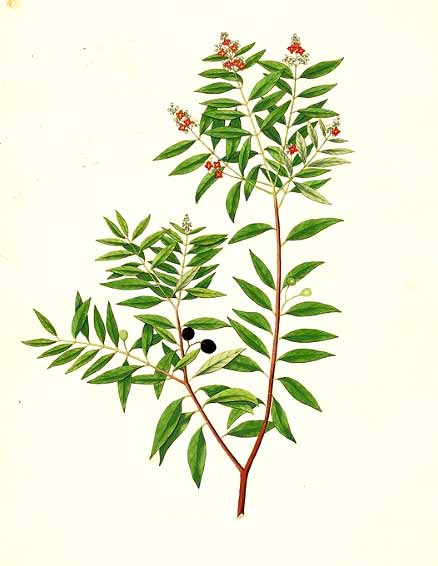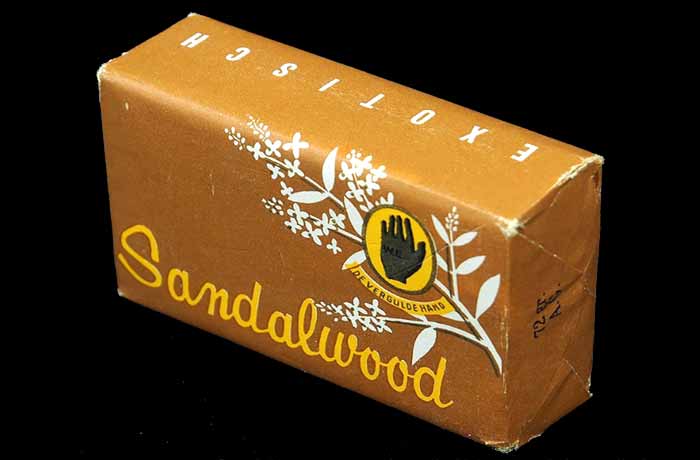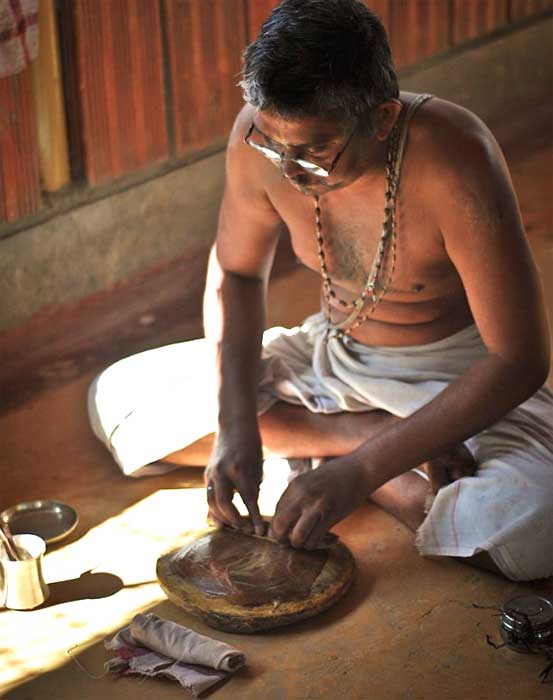Sandalwood in herbal medicine and aromatherapy

Sandalwood (Santalum album) makes a long lasting, lingering perfume that is highly valued. Sandalwood essential oil is distilled from the sandalwood tree's wood and bark.
Sandalwood has a deep, woodsy scent and is becoming more and more expensive as trees are over-harvested. Real sandalwood essential oil is not readily available, and can be hard to find. Expect to pay around $400 per liquid ounce if you can get the real stuff.
Sandalwood oil is sensual and exotic with an aroma that lingers on clothing for weeks. Sandalwood oil is warming, purifying, and relaxing. It is antidepressant, antiseptic, and antispasmodic.
Sandalwood is burned as incense to help in meditation. The aroma is long lasting and although calming, can awaken passion. It is often used in aromatherapy.
Sandalwood for the urinary tract, bladder, and the kidneys
Sandalwood acts like a tonic when used to treat the urinary tract, bladder, and kidneys.
It is also good when treating sore throat and chest infection. Sandalwood can soothe stubborn bouts of bronchitis when nothing else seems to help.

Sandalwood essential oil stimulates the immune system.
It can be dabbed neat on swollen lymph glands to help stimulate the immunity.
Sandalwood helps heal skin problems like boils and hard to heal sores.
It relieves itching especially on the neck and scalp. Sandalwood is often used in the treatment of dandruff.
It is an excellent addition to hair rinses and aftershave lotions.
Sandalwood essential is calming.
This essential oil is good for treating upset stomach, heartburn, and diarrhea. It has a calming effect on the whole digestive system.
Sandalwood is often used in the treatment of insomnia and anxiety.
It helps relieve nervous conditions by promoting a feeling of confidence and well being.
The science of sandalwood essential oil
Sandalwood essential oil is proven to help treat acne, psoriasis, eczema, common warts, and other skin conditions.
There are over a dozen species of sandalwoods.
In Australia, only two are listed by the Organization for Standardization - Santalum album and Santalum spicatum. S. Album produces oil with the most alpha and beta santalol. This substance is very anti-inflammatory and anti-oxidant.
Alpha santalol is an inhibitor of tyrosinases, an enzyme that affects skin pigments. Studies suggest that alpha santalol may be useful for treating aging skin and skin exposed to ultraviolet light.
Sandalwood oil is also shown to be anti-microbial. It fights yeast overgrowth and viruses including herpes.
This healing oil also helps protect against tumor formation.
When used in herbal medicine, sandalwood essential oil is safe and well-tolerated. More clinical trial are currently underway. I can't wait to see what they find out next.

More about sandalwood
Known as Chandana in Sanskrit, sandalwood is a big part of India's culture. The heartwood is considered sacred, and is ground as part of religious ceremonies.
It is also popular in ayurvedic and Chinese medicine.
Sandalwood cools and helps to dissipate heat in the body.
Modern medicine is finding a variety of uses for sandalwood. The essential oil has many pharmacological effects.
Sandalwood is similar to male hormone androsterone.
It is similar to androsterone (a male hormone) and is also used as an aphrodisiac to ignite passion. Sandalwood essential oil helps regulate the reproductive system.
Sandalwood essential oil is often used as an aid to meditation.
Sandalwood essential oil is said to awaken dormant energy at the base of the spine. In aromatherapy, sandalwood is used to help break ties with the past.
Sandalwood essential oil softens the skin.
Sandalwood, like lavender, is one of the few essential oils that can be used neat on the skin (but not near the eyes). It is used to soften dry skin and actually encourages the skin to hold moisture.
Sandalwood essential oil is an excellent choice when treating chapped lips, oily skin, scars, stretch marks, and sensitive skin.
Sandalwood is used in perfume, soaps, lip balms, shampoos, conditioners, face creams, aftershaves, and lotions. It helps give creams and other mixtures a longer shelf life.

Sandalwood essential oil plays an important part in Hindu marriages.
Sandalwood essential oil is burned on the wedding night so that fumes surround the new couple. In some cultures, sandalwood essential oil is mixed with rose water and used to wash away the sins of the year.
Sandalwood essential oil is great in a winter bath.
Sandalwood essential oil softens winter skin and gives the whole body a warm glow. Use with rose essential oil for added benefits.
Sandalwood essential oil repels insects.
Sandalwood essential oil can be used to repel ants and other kitchen pests. It is a safe alternative to pesticide sprays.
Please note that sandalwood oil is sometimes diluted with inferior oils. This is due to the high demand, the high price, and the scarcity of the real product.
Since 1998, harvesting and export of wild-growing Indian trees has been highly restricted. What we can buy on the international market comes from sustainable cultivated trees on Australian plantations.
Always purchase sandalwood essential oil from a reputable dealer. When purchasing essential oils, beware of cheap products especially when shopping online. There are bargains to be found, but real essential oils are not cheap.
* Keep all essential oils away from the eyes. Do not take essential oils internally without consulting a qualified professional. Always dilute essential oils with good carrier oil and test on small area of skin before use.
Always consult with a healthcare professional before using any herbal remedy especially if pregnant, nursing, or taking other medicines.
Sources:
https://www.ncbi.nlm.nih.gov/pmc/articles/PMC5749697/
https://www.ncbi.nlm.nih.gov/pmc/articles/PMC6536050/
Blessings to you and yours!
Thanks so much for reading my blog. Jan.

*Note - the information on this website has not been evaluated by the Food and Drug Administration.
© 2005-2024 website design and content by Janice Boling